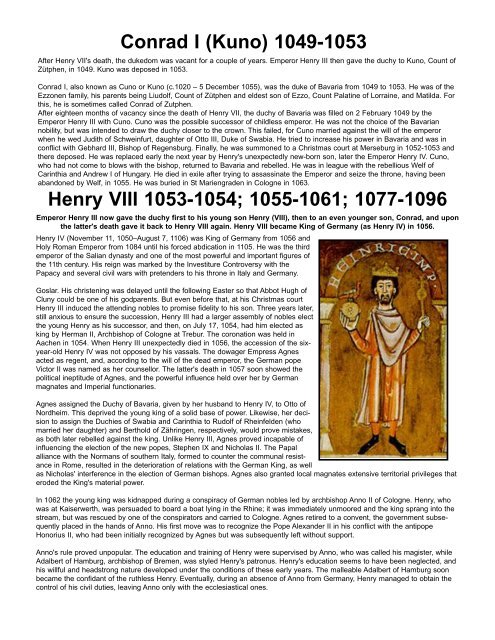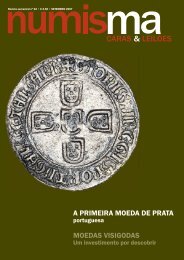You also want an ePaper? Increase the reach of your titles
YUMPU automatically turns print PDFs into web optimized ePapers that Google loves.
Conrad I (Kuno) 1049-1053<br />
After Henry VII's death, the dukedom was vacant for a couple <strong>of</strong> years. Emperor Henry III then gave the duchy to Kuno, Count <strong>of</strong><br />
Zütphen, in 1049. Kuno was deposed in 1053.<br />
Conrad I, also known as Cuno or Kuno (c.1020 – 5 December 1055), was the duke <strong>of</strong> <strong>Bavaria</strong> from 1049 to 1053. He was <strong>of</strong> the<br />
Ezzonen family, his parents being Liudolf, Count <strong>of</strong> Zütphen and eldest son <strong>of</strong> Ezzo, Count Palatine <strong>of</strong> Lorraine, and Matilda. For<br />
this, he is sometimes called Conrad <strong>of</strong> Zutphen.<br />
After eighteen months <strong>of</strong> vacancy since the death <strong>of</strong> Henry VII, the duchy <strong>of</strong> <strong>Bavaria</strong> was filled on 2 February 1049 by the<br />
Emperor Henry III with Cuno. Cuno was the possible successor <strong>of</strong> childless emperor. He was not the choice <strong>of</strong> the <strong>Bavaria</strong>n<br />
nobility, but was intended to draw the duchy closer to the crown. This failed, for Cuno married against the will <strong>of</strong> the emperor<br />
when he wed Judith <strong>of</strong> Schweinfurt, daughter <strong>of</strong> Otto III, Duke <strong>of</strong> Swabia. He tried to increase his power in <strong>Bavaria</strong> and was in<br />
conflict with Gebhard III, Bishop <strong>of</strong> Regensburg. Finally, he was summoned to a Christmas court at Merseburg in 1052-1053 and<br />
there deposed. He was replaced early the next year by Henry's unexpectedly new-born son, later the Emperor Henry IV. Cuno,<br />
who had not <strong>com</strong>e to blows with the bishop, returned to <strong>Bavaria</strong> and rebelled. He was in league with the rebellious Welf <strong>of</strong><br />
Carinthia and Andrew I <strong>of</strong> Hungary. He died in exile after trying to assassinate the Emperor and seize the throne, having been<br />
abandoned by Welf, in 1055. He was buried in St Mariengraden in Cologne in 1063.<br />
Henry VIII 1053-1054; 1055-1061; 1077-1096<br />
Emperor Henry III now gave the duchy first to his young son Henry (VIII), then to an even younger son, Conrad, and upon<br />
the latter's death gave it back to Henry VIII again. Henry VIII became King <strong>of</strong> Germany (as Henry IV) in 1056.<br />
Henry IV (November 11, 1050–August 7, 1106) was King <strong>of</strong> Germany from 1056 and<br />
Holy Roman Emperor from 1084 until his forced abdication in 1105. He was the third<br />
emperor <strong>of</strong> the Salian dynasty and one <strong>of</strong> the most powerful and important figures <strong>of</strong><br />
the 11th century. His reign was marked by the Investiture Controversy with the<br />
Papacy and several civil wars with pretenders to his throne in Italy and Germany.<br />
Goslar. His christening was delayed until the following Easter so that Abbot Hugh <strong>of</strong><br />
Cluny could be one <strong>of</strong> his godparents. But even before that, at his Christmas court<br />
Henry III induced the attending nobles to promise fidelity to his son. Three years later,<br />
still anxious to ensure the succession, Henry III had a larger assembly <strong>of</strong> nobles elect<br />
the young Henry as his successor, and then, on July 17, 1054, had him elected as<br />
king by Herman II, Archbishop <strong>of</strong> Cologne at Trebur. The coronation was held in<br />
Aachen in 1054. When Henry III unexpectedly died in 1056, the accession <strong>of</strong> the sixyear-old<br />
Henry IV was not opposed by his vassals. The dowager Empress Agnes<br />
acted as regent, and, according to the will <strong>of</strong> the dead emperor, the German pope<br />
Victor II was named as her counsellor. The latter's death in 1057 soon showed the<br />
political ineptitude <strong>of</strong> Agnes, and the powerful influence held over her by German<br />
magnates and Imperial functionaries.<br />
Agnes assigned the Duchy <strong>of</strong> <strong>Bavaria</strong>, given by her husband to Henry IV, to Otto <strong>of</strong><br />
Nordheim. This deprived the young king <strong>of</strong> a solid base <strong>of</strong> power. Likewise, her decision<br />
to assign the Duchies <strong>of</strong> Swabia and Carinthia to Rudolf <strong>of</strong> Rheinfelden (who<br />
married her daughter) and Berthold <strong>of</strong> Zähringen, respectively, would prove mistakes,<br />
as both later rebelled against the king. Unlike Henry III, Agnes proved incapable <strong>of</strong><br />
influencing the election <strong>of</strong> the new popes, Stephen IX and Nicholas II. The Papal<br />
alliance with the Normans <strong>of</strong> southern Italy, formed to counter the <strong>com</strong>munal resistance<br />
in Rome, resulted in the deterioration <strong>of</strong> relations with the German King, as well<br />
as Nicholas' interference in the election <strong>of</strong> German bishops. Agnes also granted local magnates extensive territorial privileges that<br />
eroded the King's material power.<br />
In 1062 the young king was kidnapped during a conspiracy <strong>of</strong> German nobles led by archbishop Anno II <strong>of</strong> Cologne. Henry, who<br />
was at Kaiserwerth, was persuaded to board a boat lying in the Rhine; it was immediately unmoored and the king sprang into the<br />
stream, but was rescued by one <strong>of</strong> the conspirators and carried to Cologne. Agnes retired to a convent, the government subsequently<br />
placed in the hands <strong>of</strong> Anno. His first move was to recognize the Pope Alexander II in his conflict with the antipope<br />
Honorius II, who had been initially recognized by Agnes but was subsequently left without support.<br />
Anno's rule proved unpopular. The education and training <strong>of</strong> Henry were supervised by Anno, who was called his magister, while<br />
Adalbert <strong>of</strong> Hamburg, archbishop <strong>of</strong> Bremen, was styled Henry's patronus. Henry's education seems to have been neglected, and<br />
his willful and headstrong nature developed under the conditions <strong>of</strong> these early years. The malleable Adalbert <strong>of</strong> Hamburg soon<br />
became the confidant <strong>of</strong> the ruthless Henry. Eventually, during an absence <strong>of</strong> Anno from Germany, Henry managed to obtain the<br />
control <strong>of</strong> his civil duties, leaving Anno only with the ecclesiastical ones.

















